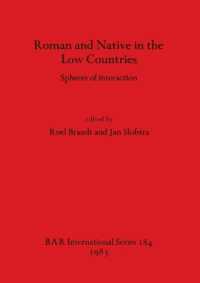- ホーム
- > 洋書
- > 英文書
- > Business / Economics
基本説明
Offers an evidence-based comprehensive critique of the neoliberal market-led agrarian reform.
Full Description
Three-fourths of the world's poor are rural poor. Most of the rural poor remain dependent on land-based livelihoods for their incomes and reproduction despite significant livelihood diversification in recent years. Land issue remains critical to any development discourse today. Market-led agrarian reform (MLAR) has gained prominence since the early 1990s as an alternative to state-led land reforms. This neoliberal policy is based on the inversion of what its proponents see as the features of earlier approaches, and calls for redistribution via privatized, decentralized transactions between 'willing sellers' and 'willing buyers'. Its proponents, especially those associated with the World Bank, have claimed success where the policy has been implemented, but such claims have been contested by independent scholars as well as by peasant movements who are struggling to gain access to land.
This book presents three thematic papers and six country studies. The thematic papers address issues of formalisation of property rights, gendered land rights, and neoliberal enclosure. These studies demonstrate the pervasive influence of neoliberal ideas on property rights and rural development debates, well beyond the 'core' question of land redistribution. The country cases bring together experiences from Brazil, Guatemala, El Salvador, Philippines, South Africa and Egypt. Common findings include the success of landowners in minimising the impact of reform, and a lack of post-transfer support, translating into marginal impact on poverty.
The limitations of the market-led approach, and the implications of the studies presented here for the future of agrarian reform, are considered in the editors' introduction.
This book was a special issue of The Third World Quarterly.
Contents
1 Market-led agrarian reform: policies, performance and prospects Edward Lahiff, Saturnino M. Borras Jr. and CristóbalKay 2 Land, markets and neoliberal enclosure: an agrarian political economy perspective A Haroon Akram-Lodhi 3 De Soto and land relations in rural Africa: breathing life into dead theories about property rights Celestine Nyamu Musembi 4 Liberalisation and the debates on women's access to land Shahra Razavi 5 Social movements and the experience of market-led agrarian reform in Brazil Leonilde Servolo de Medeiros 6 Eliminating market distortions, perpetuating rural inequality: an evaluation of market-assisted land reform in Guatemala Susana Gauster and S Ryan Isakson 7 The politics of peace and resettlement through El Salvador's land transfer programme: caught between the state and the market Ariane De Bremond 8 Anti-poverty or Anti-poor? The World Bank's market-led agrarian reform experiment in the Philippines Saturnino M. Borras Jr., Danilo Carranza and Jennifer C. Franco 9 'Willing buyer, willing seller': South Africa's failed experiment in market-led agrarian reform Edward Lahiff 10 Politics, power and poverty: twenty years of agricultural reform and market liberalisation in Egypt Ray Bush








